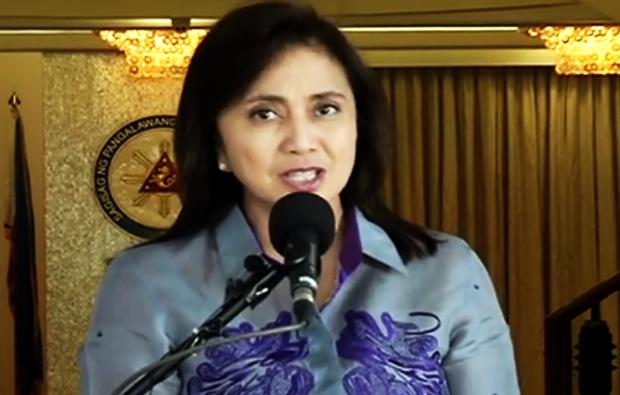Robredo: Military control won’t end Customs corruption

Vice President Leni Robredo (Photo from a video posted on her Facebook timeline)
Vice President Leni Robredo slammed what she called the militarization of the government under the Duterte administration, adding that corruption would only be solved if systems that allow could be reformed.
“Bawal ito sa Saligang Batas. Klaro sa Saligang Batas na iyong gobyerno natin ay civilian na gobyerno,” Robredo said in an interview with a local radio station on Sunday.
[The Constitution prohibits this. The Constitution makes it clear we should a civilian government.]
“Kaya nga pinapamunuan ito ng Pangulo. Kaya nga iyong Pangulo ay iyong commander-in-chief ng Armed Forces. Parang pagpapahiwatig ito na iyong civilian government, mas mataas kaysa [militar], parang siya iyong iiral sa atin,” she added.
[That’s why it’s headed by a President. That’s it’s the President who is the commander-in-chief of the Armed Forces. This suggests that civilian government is higher than the military, so that it is what should prevail.]
Article continues after this advertisementRobredo opposed Duterte’s move to put the Bureau of Customs (BOC) under military control due to the unmitigated corruption within the agency.
Article continues after this advertisementREAD: Duterte puts Customs under military control
“Iyong sa akin, hindi militarization iyong solusyon. Dapat tingnan bakit ba nagkakaganito iyong Customs. Bakit ba nagiging posible iyong ganito? Maraming mga dahilan,” she said.
[For me, militarization is not the solution. We should examine why Customs is running the way it is. What makes this situation possible? There are many reasons.]
Robredo argued that the system inside the BOC should instead be changed to prevent corruption.
“Kahit palitan natin nang palitan iyong tao, kung iyong sistema nandiyan… parang ina-allow daw niya na mangyari iyong ganito ka-grabeng korapsyon,” she said. “Dapat balikan natin iyong sistema: ano ba ang dapat baguhin? Tingin ko iyon iyong dapat pagtuunan ng pansin, hindi iyong militarization.”
[Even if we keep changing personnel, if this system is still in place… it’s like it’s allowing such corruption to happen.]
The Vice President suggested to limit face-to-face transactions in the agency and establish a computerized process instead.
“Iyong masyadong marami nang parang face-to-face na transactions, doon nag-uumpisa iyong korapsyon, eh. Dapat sana bawasan iyon, o i-limit iyong human interaction pagdating sa Customs,” she said. “Kung i-computerize iyong halos lahat ng proseso, mababawasan talaga iyong korapsyon. Kaya tingin ko ang dapat pinagkakaabalahan, pag-assess ng sistema.”
[Too many face-to-face transactions allow corruption to start. We should limit such interaction at Customs. If almost all processes can be computerized, corruption can be lessened. So I think we should focus on assessing the system.]
Meanwhile, Robredo urged the administration to go after big-time drug syndicates that smuggle illegal drugs into the country as it allowed small-time drug transactions.
“Parang grabe iyong buhay na isinugal na natin dahil sa paglaban natin sa drugs. Pero kung ang Customs natin nagpapasok at nagpapapasok ng ganito kadami, eh iyon iyong dapat nating habulin,” she said. “Huwag nating patulan iyong mga maliliit… parang pag-aksayahan talaga ng panahon iyong paghanap nitong mga malalaki, kasi wala namang negosyo itong maliliit kung hindi nakakapasok dito iyong mga malalaki.”
[We have wasted so many lives in this fight against drugs. If Customs would allow so much drugs to enter, then that’s what we should go after. Let’s not waste effort goign after the small dealers, because there would be no small dealers if we would not allow the big ones to get in.] /atm